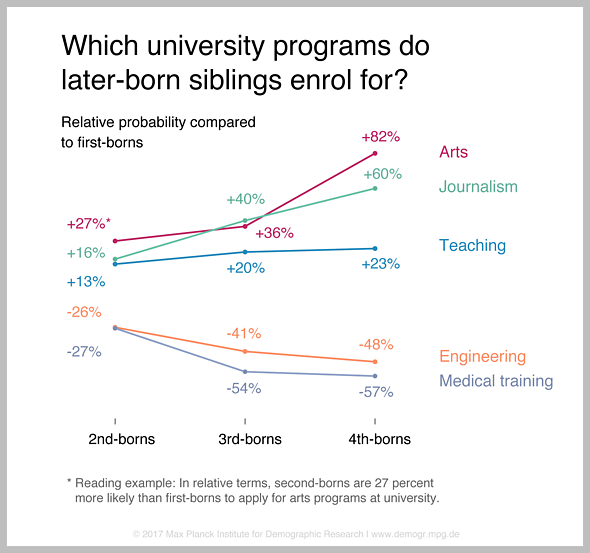November 14, 2017 | Press Release
Later-borns choose less prestigious programs at university
First-borns are more likely to study more prestigious subjects at university such as medicine and engineering and can thus expect greater earnings than later-borns, who turn to arts, journalism and teaching.
These research findings from scientists at the Max Planck Institute for Demographic Research (MPIDR) in Rostock, Germany, and Stockholm University, Sweden, build upon earlier findings by other researchers that show that later-borns attain lower education than first-borns, and earn less money.
The MPIDR researchers investigated birth order differences in the choice of university subject between siblings in Sweden. They found that the subject choices of siblings explained half of the gap in their long-term earnings.
“Our results suggest that parents invest more in earlier-born children than in later-borns and that this shapes sibling differences in ability and ambitions even within the family,” says MPIDR demographer Kieron Barclay, who now published his findings together with MPIDR director Mikko Myrskylä and Martin Hällsten from Stockholm University in the journal Social Forces.
“The differences we found are not a simple distinction between first-borns and all other later-born siblings”, says Kieron Barclay. “For example, second-borns are less likely to study medicine than first-borns, and third-borns are less likely to study medicine than second-borns.”
In relative terms, second-borns are 27 percent less likely than first-borns to apply to medical training programs, and the difference between first-borns and third-borns was 54 percent.

How do later-borns differ from first-borns when choosing a university subject? Data: Swedish administrative registers. Download graphics as vector (PDF File, 123 kB) or pixel image (PNG File, 62 kB)
© MPIDR
The researchers also found that the relative probability of second-borns studying arts programs was 27 percent higher than for first-borns, while the difference was 36 percent between third-borns and first-borns.
“Sibling differences in choice of university program was not just a consequence of first-borns having better grades in school,” says Kieron Barclay. “When we controlled for grades from upper-secondary school, the birth order differences in university programs persisted. This suggests that the home environment shapes attitudes and preferences beyond academic ability.”
Although the new MPIDR study did not deal with the explanation for these birth order differences, it seems like that parental care plays a crucial role. “First-borns benefit exclusively from parents’ attention as long as they are the only child at home,” says Mikko Myrskylä. “This gives them an early head start.”
For their study the researchers used Swedish administrative register data. All families where at least two siblings had applied to a university program were included in the analysis. Overall the study examined 146,000 students born between 1982 and 1990, who enrolled at university during the years 2001 to 2012.
About the MPIDR
The Max Planck Institute for Demographic Research (MPIDR) in Rostock investigates the structure and dynamics of populations. The Institute’s researchers explore issues of political relevance, such as demographic change, aging, fertility, and the redistribution of work over the life course, as well as digitization and the use of new data sources for the estimation of migration flows. The MPIDR is one of the largest demographic research bodies in Europe and is a worldwide leader in the study of populations. The Institute is part of the Max Planck Society, the internationally renowned German research organization.
Associated Information for Download
This press release (PDF File, 179 kB)
Graphics:
Which university programs do later-born siblings enrol for? (PDF File, 123 kB)
Which university programs do later-born siblings enrol for? (PNG File, 62 kB)
Original publication
Barclay, K., M. Hällsten and M. Myrskylä: Birth order and college major in Sweden. Social Forces [First published online: 31 October 2017]. DOI:10.1093/sf/sox069
Contact
Press and Public Relations